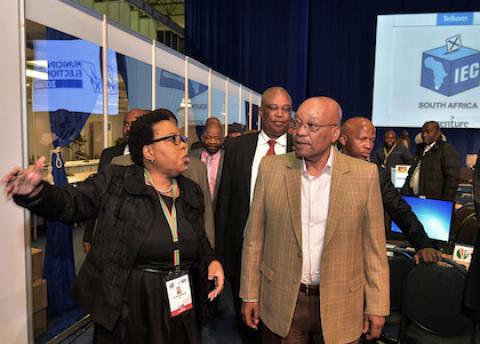South Africans have delivered a stinging rebuke to the ANC, handing the party its first major election setback since it swept to power after the end of apartheid over two decades ago.
Frustrated at a stagnant economy, a 25% unemployment rate and corruption allegations that have dogged Jacob Zuma, the president, voters in local elections turned away from the ruling party in their millions and it conceded defeat in one of the three cities where it faced the strongest challenge.
The ANC is likely to claim a slim overall majority when final results are announced but it has already accepted it has lost Port Elizabeth, an industrial city on the south coast, ahead of final results for the other hotly-contested cities of Johannesburg, the economic hub, and Pretoria, the capital.
According to Reuters, the opposition Democratic Alliance (DA) holds a narrow lead in the capital, Pretoria, while it is level with the ANC in Johannesburg. Final results are expected later on Friday.
In the Nelson Mandela Bay area, which includes Port Elizabeth, the DA secured enough votes to promise that although they would need to govern in coalition, they would not partner with the ANC. With 98.6% of ballots counted, the DA had 46.7% of the vote compared with the ANC’s 40.4%.
The three cities together are home to more than 8 million people, with annual budgets of about $10bn (£7.5bn). The loss of control, amid plummeting overall support for the ANC, will be a major psychological blow to a party so convinced of its right to rule that the general secretary recently declared it had a mandate from God.
As the scale of their advances became clear, opposition leaders were quick to claim their victory as a transformation not just of local councils but of the national political landscape. “We have shown some incredible growth,” Mmusi Maimane, the DA’s first black leader, told 702 radio. “We call this the change election because we felt that it was a referendum on Jacob Zuma as a national figure, but we also had a referendum about the future of South Africa.”
For decades the ANC has claimed an unshakeable dominance of South African politics, entering elections with an expectation of victory that critics say has contributed to stagnation and corruption.
This election will be the first time the party of the anti-apartheid hero, Nelson Mandela, has won less than 60% of the vote since country’s first multiracial poll in 1994.
Thursday’s vote sent a clear message that the years when South Africa effectively operated as a one-party system are over, or drawing towards a close. A record number of voters, over 26 million, registered for the election, with rival parties apparently mobilising supporters to sign up and then attend polling stations far more effectively than the ANC.
The DA was particularly strong in more prosperous suburban areas around the cities, said election analyst Dawie Scholtz. But it also showed that a party once dismissed as the voice of the white middle classes could challenge the ruling party in its strongholds. “The DA did also make modest inroads into the ANC traditional township voter base,” he told the Guardian. “That point is important.”
There was also a small but significant challenge from a radical new party, the Economic Freedom Fighters, which has not taken control of any councils but claimed enough support to potentially serve as kingmaker in divided cities. Led by ex-ANC firebrand, Julius Malema, it was contesting local elections for the first time on a platform that includes promises to nationalise mines and redistribute land without compensation.
The results will be damaging to Zuma. In a personal blow, the ANC also failed to take control of his home ward of Nkandla from the Zulu Nationalist Inkatha Freedom party (IPF).
“Jacob Zuma will go home to an IFP-run ward, go to parliament in a DA-run city and likely to work in a DA-run capital city,” said the DA’s spokesperson, Phumzile Van Damme in a triumphant tweet.
The results will increase pressure on Zuma, whose critics inside the party say he is irrevocably tainted and would like to see him step down before his term ends in three years, making way for a new leader to contest the 2019 general election.
They are likely to be shrugged off by a man who has weathered months of serious scandals with his power-base largely intact. Earlier this year he was ordered by the constitutional court to repay over a half a million dollars of state money spent on upgrades to his personal home, which has become a virtual byword for corruption.
He has also been accused of allowing a family of businessmen, the Guptas, undue influence in national affairs. Several senior politicians have alleged that family members were involved in deciding cabinet appointments.
Zuma’s handling of the economy has caused particular frustration. South Africa is plagued by stagnation and crippling unemployment, which affects over a quarter of working-age South Africans and disproportionately its young people.
There is also anger about widespread inequality. About 80% of South Africa’s 54 million citizens are black, but most land and companies remain in the hands of white people who make up fewer than 10% of the population.
“While the middle classes are upset about government incompetence and corruption, the working classes are economically frustrated by the lack of jobs – good paying or not,” said Sebastian Spio-Garbrah, DaMina Advisors’ chief Africa frontier markets analyst.
The DA has capitalised on a reputation for efficient management in the one city it does control, Cape Town, to lure voters hoping for a revival in an economy that never fully recovered from the 2008 global economic crisis and which is still teetering on the brink of recession. It has promised to liberalise the economy, including cutting red tape and making it easier to hire and fire workers, and even modest urban victories for the DA are likely to be welcomed by markets and investors.


Spread the word